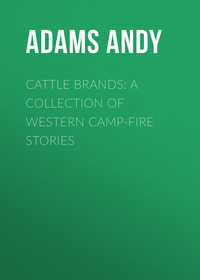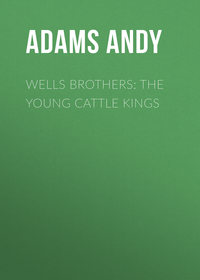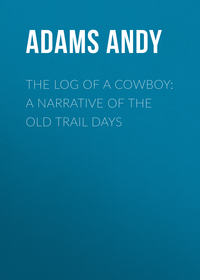 полная версия
полная версияReed Anthony, Cowman: An Autobiography
I was to have sixty dollars a month and board. The company operated a commissary store, a regular "pluck-me" concern, and I shortly understood the incentive in offering me such good wages. All employees were encouraged and expected to draw their pay in supplies, which were sold at treble their actual value from the commissary. I had been raised among negroes, knew how to humor and handle them, the work was easy, and I drifted along with all my faculties alert. Before long I saw that the improvement of the river was the least of the company's concern, the employment of a large number of men being the chief motive, so long as they drew their wages in supplies. True, we scattered a few lodgments of driftwood; with the aid of a flat-bottomed scow we windlassed up and cut out a number of old snags, felled trees into the river to prevent erosion of its banks, and we built a large number of wind-dams to straighten or change the channel. It seemed to be a blanket contract,—a reward to the faithful,—and permitted of any number of extras which might be charged for at any figures the contractors saw fit to make. At the end of the first month I naturally looked for my wages. Various excuses were made, but I was cordially invited to draw anything needed from the commissary.
A second month passed, during which time the only currency current was in the form of land certificates. The Commonwealth of Texas, on her admission into the Union, retained the control of her lands, over half the entire area of the State being unclaimed at the close of the civil war. The carpet-bag government, then in the saddle, was prodigal to its favorites in bonuses of land to any and all kinds of public improvement. Certificates were issued in the form of scrip calling for sections of the public domain of six hundred and forty acres each, and were current at from three to five cents an acre. The owner of one or more could locate on any of the unoccupied lands of the present State by merely surveying and recording his selection at the county seat. The scrip was bandied about, no one caring for it, and on the termination of my second month I was offered four sections for my services up to date, provided I would remain longer in the company's employ. I knew the value of land in the older States, in fact, already had my eye on some splendid valleys on the Clear Fork, and accepted the offered certificates. The idea found a firm lodgment in my mind, and I traded one of my six-shooters even for a section of scrip, and won several more in card games. I had learned to play poker in the army,—knew the rudiments of the game at least,—and before the middle of March I was the possessor of certificates calling for thirty sections of land. As the time was drawing near for my return to Palo Pinto County, I severed my connection with the dredging company and returned to the home of my old comrade. I had left my horse with him, and under the pretense of paying for feeding the animal well for the return trip, had slipped my crony a small gold piece several times during the winter. He ridiculed me over my land scrip, but I was satisfied, and after spending a day with the couple I started on my return.
Evidences of spring were to be seen on every hand. My ride northward was a race with the season, but I outrode the coming grass, the budding trees, the first flowers, and the mating birds, and reached the Edwards ranch on the last day of March. Any number of cattle had already been tendered in making up the herd, over half the saddle horses necessary were in hand or promised, and they were only awaiting my return. I had no idea what the requirements of the Kansas market were, and no one else seemed to know, but it was finally decided to drive a mixed herd of twenty-five hundred by way of experiment. The promoters of the Abilene market had flooded Texas with advertising matter during the winter, urging that only choice cattle should be driven, yet the information was of little value where local customs classified all live stock. A beef was a beef, whether he weighed eight or twelve hundred pounds, a cow was a cow when over three years old, and so on to the end of the chapter. From a purely selfish motive of wanting strong cattle for the trip, I suggested that nothing under three-year-olds should be used in making up the herd, a preference to be given matured beeves. George Edwards also favored the idea, and as our experience in trailing cattle carried some little weight, orders were given to gather nothing that had not age, flesh, and strength for the journey.
I was to have fifty dollars a month and furnish my own mount. Horses were cheap, but I wanted good ones, and after skirmishing about I secured four to my liking in return for one hundred dollars in gold. I still had some money left from my wages in driving cattle to Fort Sumner, and I began looking about for oxen in which to invest the remainder. Having little, I must be very careful and make my investment in something staple; and remembering the fine prices current in Colorado the spring before for work cattle, I offered to supply the oxen for the commissary. My proposal was accepted, and accordingly I began making inquiry for wagon stock. Finally I heard of a freight outfit in the adjoining county east, the owner of which had died the winter before, the administrator offering his effects for sale. I lost no time in seeing the oxen and hunting up their custodian, who proved to be a frontier surveyor at the county seat. There were two teams of six yoke each, fine cattle, and I had hopes of being able to buy six or eight oxen. But the surveyor insisted on selling both teams, offering to credit me on any balance if I could give him security. I had never mentioned my land scrip to any one, and wishing to see if it had any value, I produced and tendered the certificates to the surveyor. He looked them over, made a computation, and informed me that they were worth in his county about five cents an acre, or nearly one thousand dollars. He also offered to accept them as security, assuring me that he could use some of them in locating lands for settlers. But it was not my idea to sell the land scrip, and a trade was easily effected on the twenty-four oxen, yokes, and chains, I paying what money I could spare and leaving the certificates for security on the balance. As I look back over an eventful life, I remember no special time in which I felt quite as rich as the evening that I drove into the Edwards ranch with twelve yoke of oxen chained together in one team. The darkies and Mexicans gathered about, even the family, to admire the big fellows, and I remember a thrill which shivered through me as Miss Gertrude passed down the column, kindly patting each near ox as though she felt a personal interest in my possessions.
We waited for good grass before beginning the gathering. Half a dozen round-ups on the home range would be all that was necessary in completing the numbers allotted to the Edwards ranch. Three other cowmen were going to turn in a thousand head and furnish and mount a man each, there being no occasion to road-brand, as every one knew the ranch, brands which would go to make up the herd. An outfit of twelve men was considered sufficient, as it was an open prairie country and through civilized tribes between Texas and Kansas. All the darkies and Mexicans from the home ranch who could be spared were to be taken along, making it necessary to hire only three outside men. The drive was looked upon as an experiment, there being no outlay of money, even the meal and bacon which went into the commissary being supplied from the Edwards household. The country contributed the horses and cattle, and if the project paid out, well and good; if not there was small loss, as they were worth nothing at home. The 20th of April was set for starting. Three days' work on the home range and we had two thousand cattle under herd, consisting of dry or barren cows and steers three years old or over, fully half the latter being heavy beeves. We culled back and trimmed our allotment down to sixteen hundred, and when the outside contingents were thrown in we had a few over twenty-eight hundred cattle in the herd. A Mexican was placed in charge of the remuda, a darky, with three yoke of oxen, looked after the commissary, and with ten mounted men around the herd we started.
Five and six horses were allotted to the man, each one had one or two six-shooters, while half a dozen rifles of different makes were carried in the wagon. The herd moved northward by easy marches, open country being followed until we reached Red River, where we had the misfortune to lose George Edwards from sickness. He was the foreman from whom all took orders. While crossing into the Chickasaw Nation it was necessary to swim the cattle. We cut them into small bunches, and in fording and refording a whole afternoon was spent in the water. Towards evening our foreman was rendered useless from a chill, followed by fever during the night. The next morning he was worse, and as it was necessary to move the herd out to open country, Edwards took an old negro with him and went back to a ranch on the Texas side. Several days afterward the darky overtook us with the word that his master would be unable to accompany the cattle, and that I was to take the herd through to Abilene. The negro remained with us, and at the first opportunity I picked up another man. Within a week we encountered a country trail, bearing slightly northwest, over which herds had recently passed. This trace led us into another, which followed up the south side of the Washita River, and two weeks after reaching the Nation we entered what afterward became famous as the Chisholm trail. The Chickasaw was one of the civilized tribes; its members had intermarried with the whites until their identity as Indians was almost lost. They owned fine homes and farms in the Washita valley, were hospitable to strangers, and where the aboriginal blood was properly diluted the women were strikingly beautiful. In this same valley, fifteen years afterward, I saw a herd of one thousand and seven head of corn-fed cattle. The grain was delivered at feed-lots at ten cents a bushel, and the beeves had then been on full feed for nine months. There were no railroads in the country and the only outlet for the surplus corn was to feed it to cattle and drive them to some shipping-point in Kansas.
Compared with the route to Fort Sumner, the northern one was a paradise. No day passed but there was an abundance of water, while the grass simply carpeted the country. We merely soldiered along, crossing what was then one of the No-man's lands and the Cherokee Outlet, never sighting another herd until after entering Kansas. We amused ourselves like urchins out for a holiday, the country was full of all kinds of game, and our darky cook was kept busy frying venison and roasting turkeys. A calf was born on the trail, the mother of which was quite gentle, and we broke her for a milk cow, while "Bull," the youngster, became a great pet. A cow-skin was slung under the wagon for carrying wood and heavy cooking utensils, and the calf was given a berth in the hammock until he was able to follow. But when Bull became older he hung around the wagon like a dog, preferring the company of the outfit to that of his own mother. He soon learned to eat cold biscuit and corn-pone, and would hang around at meal-time, ready for the scraps. We always had to notice where the calf lay down to sleep, as he was a black rascal, and the men were liable to stumble over him while changing guards during the night. He never could be prevailed on to walk with his mother, but followed the wagon or rode in his hammock, and was always happy as a lark when the recipient of the outfit's attentions. We sometimes secured as much as two gallons of milk a day from the cow, but it was pitiful to watch her futile efforts at coaxing her offspring away from the wagon.
We passed to the west of the town of Wichita and reached our destination early in June. There I found several letters awaiting me, with instructions to dispose of the herd or to report what was the prospect of effecting a sale. We camped about five miles from Abilene, and before I could post myself on cattle values half a dozen buyers had looked the herd over. Men were in the market anxious for beef cattle with which to fill army and Indian contracts, feeders from Eastern States, shippers and speculators galore, cowmen looking for she stuff with which to start new ranches, while scarcely a day passed but inquiry was made by settlers for oxen with which to break prairie. A dozen herds had arrived ahead of us, the market had fairly opened, and, once I got the drift of current prices, I was as busy as a farmer getting ready to cut his buckwheat. Every yoke of oxen was sold within a week, one ranchman took all the cows, an army contractor took one thousand of the largest beeves, feeders from Iowa took the younger steers, and within six weeks after arriving I did not have a hoof left. In the mean time I kept an account of each sale, brands and numbers, in order to render a statement to the owners of the cattle. As fast as the money was received I sent it home by drafts, except the proceeds from the oxen, which was a private matter. I bought and sold two whole remudas of horses on speculation, clearing fifteen of the best ones and three hundred dollars on the transactions.
The facilities for handling cattle at Abilene were not completed until late in the season of '67, yet twenty-five thousand cattle found a market there that summer and fall. The drive of the present year would triple that number, and every one seemed pleased with future prospects. The town took on an air of frontier prosperity; saloons and gambling and dance halls multiplied, and every legitimate line of business flourished like a green bay tree. I made the acquaintance of every drover and was generally looked upon as an extra good salesman, the secret being in our cattle, which were choice. For instance, Northern buyers could see three dollars a head difference in three-year-old steers, but with the average Texan the age classified them all alike. My boyhood knowledge of cattle had taught me the difference, but in range dealing it was impossible to apply the principle. I made many warm friends among both buyers and drovers, bringing them together and effecting sales, and it was really a matter of regret that I had to leave before the season was over. I loved the atmosphere of dicker and traffic, had made one of the largest sales of the season with our beeves, and was leaving, firm in the conviction that I had overlooked no feature of the market of future value.
After selling the oxen we broke some of our saddle stock to harness, altered the wagon tongue for horses, and started across the country for home, taking our full remuda with us. Where I had gone up the trail with five horses, I was going back with twenty; some of the oxen I had sold at treble their original cost, while none of them failed to double my money—on credit. Taking it all in all, I had never seen such good times and made money as easily. On the back track we followed the trail, but instead of going down the Washita as we had come, we followed the Chisholm trail to the Texas boundary, crossing at what was afterward known as Red River Station. From there home was an easy matter, and after an absence of four months and five days the outfit rode into the Edwards ranch with a flourish.
CHAPTER VI
SOWING WILD OATS
The results from driving cattle north were a surprise to every one. My employers were delighted with their experiment, the general expense of handling the herd not exceeding fifty cents a head. The enterprise had netted over fifty-two thousand dollars, the saddle horses had returned in good condition, while due credit was given me in the general management. From my sale accounts I made out a statement, and once my expenses were approved it was an easy matter to apportion each owner his just dues in the season's drive. This over I was free to go my way. The only incident of moment in the final settlement was the waggish contention of one of the owners, who expressed amazement that I ever remitted any funds or returned, roguishly admitting that no one expected it. Then suddenly, pretending to have discovered the governing motive, he summoned Miss Gertrude, and embarrassed her with a profusion of thanks, averring that she alone had saved him from a loss of four hundred beeves.
The next move was to redeem my land scrip. The surveyor was anxious to buy a portion of it, but I was too rich to part with even a single section. During our conversation, however, it developed that he held his commission from the State, and when I mentioned my intention of locating land, he made application to do the surveying. The fact that I expected to make my locations in another county made no difference to a free-lance official, and accordingly we came to an agreement. The apple of my eye was a valley on the Clear Fork, above its juncture with the main Brazos, and from maps in the surveyor's office I was able to point out the locality where I expected to make my locations. He proved an obliging official and gave me all the routine details, and an appointment was made with him to report a week later at the Edwards ranch. A wagon and cook would be necessary, chain carriers and flagmen must be taken along, and I began skirmishing about for an outfit. The three hired men who had been up the trail with me were still in the country, and I engaged them and secured a cook. George Edwards loaned me a wagon and two yoke of oxen, even going along himself for company. The commissary was outfitted for a month's stay, and a day in advance of the expected arrival of the surveyor the outfit was started up the Brazos. Each of the men had one or more private horses, and taking all of mine along, we had a remuda of thirty odd saddle horses. George and I remained behind, and on the arrival of the surveyor we rode by way of Palo Pinto, the county seat, to which all unorganized territory to the west was attached for legal purposes. Our chief motive in passing the town was to see if there were any lands located near the juncture of the Clear Fork with the mother stream, and thus secure an established corner from which to begin our survey. But the records showed no land taken up around the confluence of these watercourses, making it necessary to establish a corner.
Under the old customs, handed down from the Spanish to the Texans, corners were always established from natural landmarks. The union of creeks arid rivers, mounds, lagoons, outcropping of rock, in fact anything unchangeable and established by nature, were used as a point of commencement. In the locating of Spanish land grants a century and a half previous, sand-dunes were frequently used, and when these old concessions became of value and were surveyed, some of the corners had shifted a mile or more by the action of the wind and seasons on the sand-hills. Accordingly, on overtaking our outfit we headed for the juncture of the Brazos and Clear Fork, reaching our destination the second day. The first thing was to establish a corner or commencement point. Some heavy timber grew around the confluence, so, selecting an old patriarch pin oak between the two streams, we notched the tree and ran a line to low water at the juncture of the two rivers. Other witness trees were established and notched, lines were run at angles to the banks of either stream, and a hole was dug two feet deep between the roots of the pin oak, a stake set therein, and the excavation filled with charcoal and covered. A legal corner or commencement point was thus established; but as the land that I coveted lay some distance up the Clear Fork, it was necessary first to run due south six miles and establish a corner, and thence run west the same distance and locate another one.
The thirty sections of land scrip would entitle me to a block of ground five by six miles in extent, and I concluded to locate the bulk of it on the south side of the Clear Fork. A permanent camp was now established, the actual work of locating the land requiring about ten days, when the surveyor and Edwards set out on their return. They were to touch at the county seat, record the established corners and file my locations, leaving the other boys and me behind. It was my intention to build a corral and possibly a cabin on the land, having no idea that we would remain more than a few weeks longer. Timber was plentiful, and, selecting a site well out on the prairie, we began the corral. It was no easy task; palisades were cut twelve feet long and out of durable woods, and the gate-posts were fourteen inches in diameter at the small end, requiring both yoke of oxen to draw them to the chosen site. The latter were cut two feet longer than the palisades, the extra length being inserted in the ground, giving them a stability to carry the bars with which the gateway was closed. Ten days were spent in cutting and drawing timber, some of the larger palisades being split in two so as to enable five men to load them on the wagon. The digging of the narrow trench, five feet deep, in which the palisades were set upright, was a sore trial; but the ground was sandy, and by dint of perseverance it was accomplished. Instead of a few weeks, over a month was spent on the corral, but when it was finished it would hold a thousand stampeding cattle through the stormiest night that ever blew.
After finishing the corral we hunted a week. The country was alive with game of all kinds, even an occasional buffalo, while wild and unbranded cattle were seen daily. None of the men seemed anxious to leave the valley, but the commissary had to be replenished, so two of us made the trip to Belknap with a pack horse, returning the next day with meal, sugar, and coffee. A cabin was begun and completed in ten days, a crude but stable affair, with clapboard roof, clay floor, and ample fireplace. It was now late in September, and as the usual branding season was at hand, cow-hunting outfits might be expected to pass down the valley. The advantage of corrals would naturally make my place headquarters for cowmen, and we accordingly settled down until the branding season was over. But the abundance of mavericks and wild cattle was so tempting that we had three hundred under herd when the first cow-hunting outfits arrived. At one lake on what is now known as South Prairie, in a single moonlight night, we roped and tied down forty head, the next morning finding thirty of them unbranded and therefore unowned. All tame cattle would naturally water in the daytime, and anything coming in at night fell a victim to our ropes. A wooden toggle was fastened with rawhide to its neck, so it would trail between its forelegs, to prevent running, when the wild maverick was freed and allowed to enter the herd. After a week or ten days, if an animal showed any disposition to quiet down, it was again thrown, branded, and the toggle removed. We corralled the little herd every night, adding to it daily, scouting far and wide for unowned or wild cattle. But when other outfits came up or down the valley of the Clear Fork we joined forces with them, tendering our corrals for branding purposes, our rake-off being the mavericks and eligible strays. Many a fine quarter of beef was left at our cabin by passing ranchmen, and when the gathering ended we had a few over five hundred cattle for our time and trouble.
Fine weather favored us and we held the mavericks under herd until late in December. The wild ones gradually became gentle, and with constant handling these wild animals were located until they would come in of their own accord for the privilege of sleeping in a corral. But when winter approached the herd was turned free, that the cattle might protect themselves from storms, and we gathered our few effects together and started for the settlements. It was with reluctance that I left that primitive valley. Somehow or other, primal conditions possessed a charm for me which, coupled with an innate love of the land and the animals that inhabit it, seemed to influence and outline my future course of life. The pride of possession was mine; with my own hands and abilities had I earned the land, while the overflow from a thousand hills stocked my new ranch. I was now the owner of lands and cattle; my father in his palmiest days never dreamed of such possessions as were mine, while youth and opportunity encouraged me to greater exertions.
We reached the Edwards ranch a few days before Christmas. The boys were settled with and returned to their homes, and I was once more adrift. Forty odd calves had been branded as the increase of my mavericking of the year before, and, still basking in the smile of fortune, I found a letter awaiting me from Major Seth Mabry of Austin, anxious to engage my services as a trail foreman for the coming summer. I had met Major Seth the spring before at Abilene, and was instrumental in finding him a buyer for his herd, and otherwise we became fast friends. There were no outstanding obligations to my former employers, so when a protest was finally raised against my going, I had the satisfaction of vouching for George Edwards, to the manner born, and a better range cowman than I was. The same group of ranchmen expected to drive another herd the coming spring, and I made it a point to see each one personally, urging that nothing but choice cattle should be sent up the trail. My long acquaintance with the junior Edwards enabled me to speak emphatically and to the point, and I lectured him thoroughly as to the requirements of the Abilene market.








